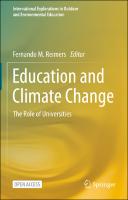Education and Climate Change
The Role of Universities
Author(s)
Reimers, Fernando M.
Contributor(s)
Reimers, Fernando M. (editor)
Language
EnglishAbstract
This open access volume draws on a multidimensional model of educational change, the book reviews the field of climate change education and identifies some of the areas in which past efforts have fallen short in supporting effective pedagogical change at scale. It then formulates an approach to engage university students and faculty in partnering with schools and adult education institutions and directly contribute innovative curricula on climate change. The approach is illustrated with several case studies which present curricula developed to support school-based innovation in the Middle East and in Guatemala, and adult education in Haiti and Pakistan, and educators preparation at the university level. The approach followed to develop innovative curriculum follows five steps: 1) What are the specific impacts of climate change in this jurisdiction? How do they impact various human populations? 2) What knowledge, dispositions and behaviors could mitigate the impact of climate change and are there ways in which changes in the behaviors of populations in this jurisdiction could slow down climate change? 3) What are the means of delivery to reach each of the specific populations in this jurisdiction who needs to be educated on climate change? 4) What curriculum can help educate each population? 5) What role can the institution we are collaborating with play in advancing climate change education in that jurisdiction? The various chapters of the book present the conceptual foundation of these programs and illustrate how these programs respond to specific characteristics of local contexts. These programs focus in schools, non-formal settings and educator preparation institutions. The chapters offer examples of general value beyond the specific contexts for which they were designed, as they illustrate how in order to be optimally useful climate change education needs to be firmly grounded in the specifics of a context and responsive to that context.
Keywords
Environmental and Sustainability Education; Curriculum Studies; Educational Policy and Politics; Science Education; International and Comparative Education; Higher Education; Open access; climate change education; Sustainability Studies; Curriculum Reform; Comparative Education; Education Policy; Educational Change; twenty first century education; climate education strategies; integrating climate change education; university climate change education; climate change education strategies; Climate Action in Guatemala; Education; Sustainability; Curriculum planning & development; Educational strategies & policy; Teaching of a specific subject; Science: general issues; Higher & further education, tertiary educationDOI
10.1007/978-3-030-57927-2Publisher
Springer NaturePublisher website
https://www.springernature.com/gp/products/booksPublication date and place
2021Imprint
Springer International PublishingSeries
International Explorations in Outdoor and Environmental Education,Classification
Education
Curriculum planning and development
Educational strategies and policy
Teaching of a specific subject
Higher education, tertiary education


 Download
Download Web Shop
Web Shop